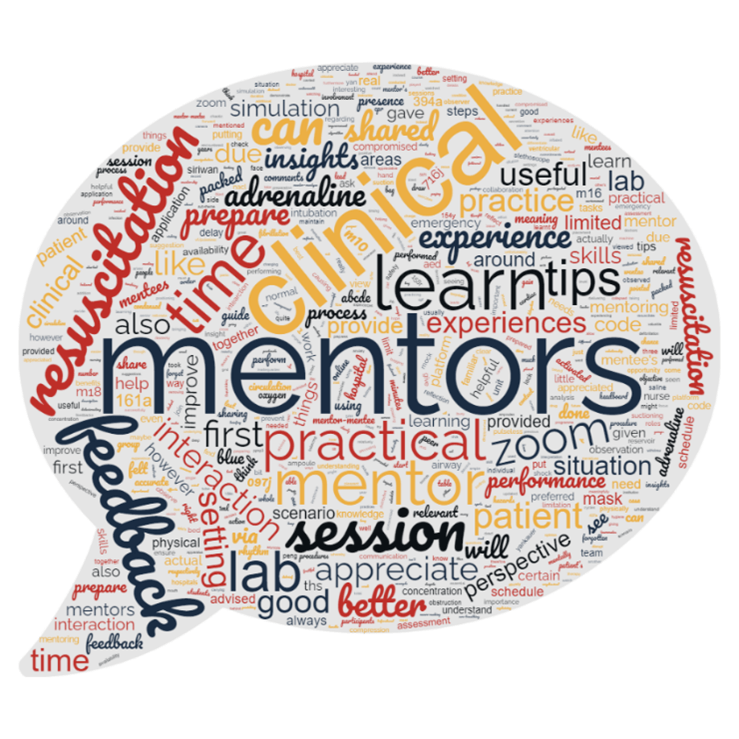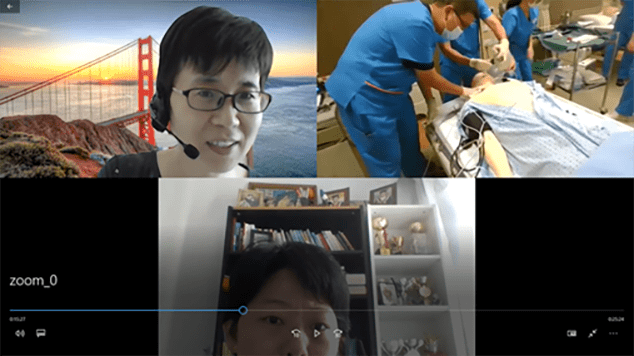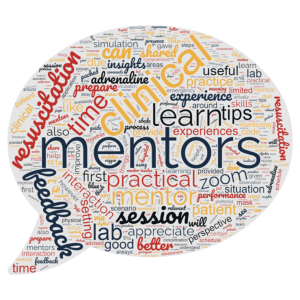Siriwan LIM, ZHOU Wentao, & DONG Yan Hong
Alice Lee Centre for Nursing Studies (ALCNS)
Siriwan, Wentao, and Yan Hong discuss how they addressed the challenges COVID-19 restrictions presented to the implementation of their study, and the different ways they harnessed these learning opportunities.

Lim, S., Zhou W. T., & Dong Y. H. (2022, Aug 30). Addressing challenges and embracing learning opportunities amidst COVID-19. Teaching Connections. https://blog.nus.edu.sg/teachingconnections/2022/08/30/addressing-challenges-embracing-learning-opportunities-amidst-covid-19/
Introduction
This post documents how our team addressed the challenges brought on by COVID-19 to our study’s implementation, and how we utilised these learning opportunities. This study1 explored students’ peer mentoring experiences in the Professional Conversion Programme (PCP)2 at the Alice Lee Centre for Nursing Studies (ALCNS) and their interaction with postgraduate nursing students at ALCNS, who act as mentors in the programme.
We were unprepared in early 2020 for the COVID-19’s global impact, especially how it changed our study plan. By March 2020, strict safe distancing measures were instituted in Singapore and face-to-face interactions were minimised. In ALCNS, nursing laboratory (lab) sessions were capped at 10 students per lab group. Our original CARES-TLC study1 plan—for CCP2 students (peer mentees) and postgraduate nursing students (peer mentors) to interact during lab sessions and their clinical postings as part of their mentoring activities—had to be shelved. We had to to overcome these strict social distancing measures to ensure students would still experience this learning opportunity despite these unprecedented pandemic-related developments.
Addressing Peer Mentoring Challenges: Lab Sessions
Mentor participation via Zoom
Firstly, we needed to decide how we could facilitate the interaction between mentees and mentors while adhering to social distancing rules. We decided the mentor could join the mentees’ resuscitation practice sessions in the lab via Zoom (Figure 1). The mentors’ clinical experience and perspectives enriched the mentees’ learning. This collaboration also gave mentors the opportunity to contribute back to the NUS nursing community.

As we were all new to setting up Zoom for the lab sessions, we encountered some hiccups along the way. For instance, we had to ensure our laptop’s camera angle was positioned such that it was high enough to give mentors an unobstructed view of the practice session without getting in the way of the mentees’ movements during the session (Figure 2).

Recorded practice sessions & online discussion forums
Another challenge we had to address was that due to timetable conflicts, the mentors could not join mentees during their practice sessions. In such situations, the sessions were recorded and uploaded to LumiNUS. Mentors could view the recorded practice sessions at their own time and provide feedback to mentees.
We also set up a discussion forum in LumiNUS (Figure 3) for mentees to raise any issues related to clinical practice which the mentors could respond to and share their views at their own pace and time.

Facilitating peer mentee-mentor interaction
As a study team, we proactively facilitated peer mentee and mentor interaction, aware that lack of face-to-face interaction would affect the quality of the mentoring relationship. We discussed with both mentees and mentors to find out their preference for meeting outside of the lab period. In the end, majority agreed that they could meet on Saturdays for sharing and discussion during Semester 1 (Figure 4).

Peer mentees’ & mentors’ responses to alternative peer mentoring solutions
The mentees’ reflections showed that although mentors were not physically present during the lab sessions, the former indicated that they gained much from the mentors’ feedback. The word cloud (Figure 5) showed that the mentees appreciated the learning process, including interacting with their mentors during the lab sessions through the various online platforms.

The peer mentors also shared takeaways from their mentoring experiences. One mentor realised the importance of “[paying] more attention, especially to the emotional aspect for all the new nurses coming to our department in the future”. Overall, the mentors found their mentoring experience to be meaningful as they could play a part in nurturing and empowering the next generation of nurses.
Addressing Peer Mentoring Challenges: Clinical Postings
Maintaining peer mentor-mentee interaction
In Semester 2, mentees were posted to their various clinical areas. The mentors could not meet them physically due to strict “no intermingling” rules between students from different institutions. To facilitate continuity of their mentoring relationships, mentees were divided into three smaller groups with one assigned mentor. They continued keeping in touch through Zoom and WhatsApp chat groups.
Data collection
Data collection in Semester 2 was also challenging as there was difficulty following up with the mentees and mentors when they were on shift duty in the clinical areas. We also experienced difficulty collecting written consent from clinical nurses in the various institutions who agreed to participate in our focus group interviews. Our study team continued exploring other means of collecting data; besides LumiNUS, NUS Qualtrics3 was another useful online platform we could use to obtain participants’ written consent.
Embracing Learning Opportunities Amidst COVID-19
Including Year 4 Honours students in the study team
Due to COVID-19, our Year 4 Honours students could only conduct systematic reviews for their thesis. For our CARES-TLC study, we opened up the learning opportunity to our part-time Research Assistant (RA), who was pursuing her Honours, to learn how to conduct a primary research. Throughout the study period, we provided close guidance and supervision. We also opened up the opportunity to another Honours student to participate in the research. We are glad that our two Honours students could apply what they have learnt in their Honours year through participating in our study (Figure 6).

Concluding Remarks
In summary, in spite of the many obstacles posed by the COVID-19 pandemic in implementing the CARES-TLC study, there were many learning opportunities waiting for us to ensure the study’s intended learning outcomes were fulfilled when we chose to look at the possibilities.
 |
Siriwan LIM is a Senior Lecturer at Alice Lee Centre for Nursing Studies (ALCNS). Siriwan is a trained Critical Care Nurse and Educator with multi-disciplinary experiences from her work in acute hospitals and various tertiary institutions. She holds a joint appointment as a Nurse Clinician with NUHS. Her current research interests include nursing education and empowerment of patients with chronic diseases. Siriwan can be reached at nursl@nus.edu.sg. |
 |
ZHOU Wentao is an Associate Professor at ALCNS. She is the Director of Education for ALCNS’ Nurses Continuing Education and Training, and the Programme Director for the Master of Nursing programme, the only programme which provides education for advanced practice nurses (APNs) in Singapore. She is also a registered neuroscience Advanced Practice Nurse (APN) and has a joint appointment with the Singapore National Neuroscience Institute (NNI). Her research interest focuses on nursing professional development. Wentao can be reached at nurzw@nus.edu.sg. |
 |
DONG Yan Hong is the first Nurse Clinician Scientist fully funded by the Singapore National Medical Research Council. She has cross-disciplinary educational and clinical background in Nursing and Clinical Neuropsychology. Her research expertise includes neurocognition, behavioural change, and heart-brain connection. She is committed to contextualising cognitive health in Nursing, mentoring Nurse Clinician Scientists to drive translational research in the Science of Care. Yan Hong can be reached at nurdy@nus.edu.sg. |
Endnotes
- Our team received the Teaching Enhancement Grant (TEG) in AY2020/21 to implement the study “Cultivating A RESponsive and Transformative Learning Community (CARES-TLC)” to support our PCP students who needed to complete the full-time nursing programme at ALCNS in two years instead of three.
- The Professional Conversion Programme (PCP) for Registered Nurses (RN) degree [now known as Career Conversion Programme (CCP)] was introduced in 2018 at ALCNS, National University of Singapore (NUS).
- Qualtrics is a web-based survey solution which is used by faculty, students, and staff at NUS to create and distribute surveys and questions for their projects. More info can be found here.

